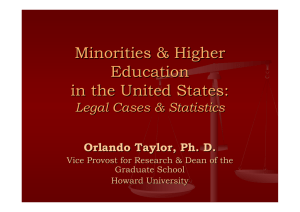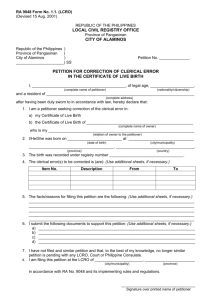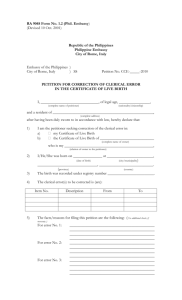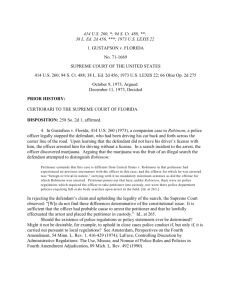recommended order of special deputy
advertisement
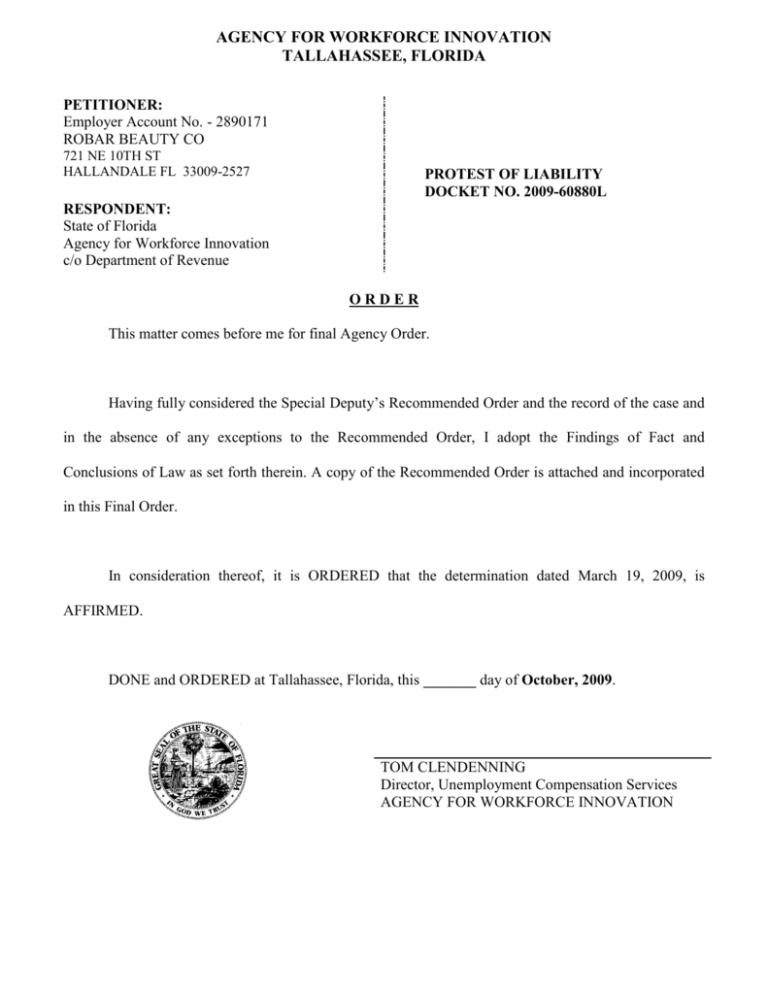
AGENCY FOR WORKFORCE INNOVATION TALLAHASSEE, FLORIDA PETITIONER: Employer Account No. - 2890171 ROBAR BEAUTY CO 721 NE 10TH ST HALLANDALE FL 33009-2527 PROTEST OF LIABILITY DOCKET NO. 2009-60880L RESPONDENT: State of Florida Agency for Workforce Innovation c/o Department of Revenue ORDER This matter comes before me for final Agency Order. Having fully considered the Special Deputy’s Recommended Order and the record of the case and in the absence of any exceptions to the Recommended Order, I adopt the Findings of Fact and Conclusions of Law as set forth therein. A copy of the Recommended Order is attached and incorporated in this Final Order. In consideration thereof, it is ORDERED that the determination dated March 19, 2009, is AFFIRMED. DONE and ORDERED at Tallahassee, Florida, this _______ day of October, 2009. TOM CLENDENNING Director, Unemployment Compensation Services AGENCY FOR WORKFORCE INNOVATION Docket No. 2009-60880L 2 of 6 AGENCY FOR WORKFORCE INNOVATION Office of Appeals MSC 347 Caldwell Building 107 East Madison Street Tallahassee FL 32399-4143 PETITIONER: Employer Account No. - 2890171 ROBAR BEAUTY CO 721 NE 10TH ST HALLANDALE FL 33009-2527 PROTEST OF LIABILITY DOCKET NO. 2009-60880L RESPONDENT: State of Florida Agency for Workforce Innovation c/o Department of Revenue RECOMMENDED ORDER OF SPECIAL DEPUTY TO: Director, Unemployment Compensation Services Agency for Workforce Innovation This matter comes before the undersigned Special Deputy pursuant to the Petitioner’s protest of the Respondent’s determination dated March 19, 2009. After due notice to the parties, a telephone hearing was held on July 13, 2009. The Petitioner, represented by its president, appeared and testified. The Petitioner's accountant testified as a witness. The Respondent, represented by a Tax Specialist II, appeared and testified. The record of the case, including the recording of the hearing and any exhibits submitted in evidence, is herewith transmitted. Proposed Findings of Fact and Conclusions of Law were not received. Issue: Whether services performed for the Petitioner by the Joined Party and other individuals working as hair stylists constitute insured employment pursuant to Sections 443.036(19), 443.036(21); 443.1216, Florida Statutes, and if so, the effective date of the liability. Findings of Fact: 1. The Petitioner is a corporation which was formed in January 2007 to operate a hair salon. The Petitioner did not open the hair salon until approximately one year after the corporation was formed. 2. The Petitioner's president is active in the operation of the business seven days a week. The president has been a hair stylist for forty years and he performs hair styling services for the Petitioner's customers. In addition, the Petitioner uses the services of approximately three other hair stylists including the Joined Party. All of the hair stylists work under the same terms and conditions; however, the Joined Party generally provides special services, such as hair extensions, for the Petitioner's customers. Docket No. 2009-60880L 3 of 6 3. The Joined Party's aunt previously worked with the Petitioner's president. The Joined Party's aunt referred the Joined Party to the Petitioner and the president interviewed the Joined Party. The Joined Party was not the first hair stylist hired by the Petitioner. Two other hair stylists worked for the Petitioner for several months prior to the date the Joined Party was hired. 4. The Petitioner's bookkeeper created a standard agreement on the Petitioner's letterhead. The Petitioner presented the agreement to the Joined Party for the Joined Party's signature. The agreement states "I understand that I am an independent contractor for Robar Beauty Company and that I am responsible for paying my own State and Federal taxes. I understand that I will be issued a 1099 form for payments received. I understand that I am not eligible for unemployment insurance. I understand that I am not eligible for workmen's comp insurance." 5. The Petitioner provides the work stations for the hair stylists and all equipment and supplies, including the hair extensions, necessary for performing the work. The Joined Party provides her own hand tools such as combs and scissors. The Joined Party's hair stylist license is posted in the Joined Party's assigned work station. 6. The Petitioner's president performs services as the shop receptionist as well as hair stylist. Generally, the president provides the hair styling for walk-in customers; however, if the president is busy the president assigns the walk-in customers to other stylists. The president answers all telephone calls and schedules the customers and hair stylists. The president determines the sequence in which the customers are serviced by the hair stylists. The hair stylists may not change the appointments set by the president. 7. The hair stylists are required to personally perform the work. They may not hire others to perform the work for them. 8. The hair stylists are required to inform the president concerning the progress of the work and the completion of the work. If a stylist has difficulty completing the work or is not able to complete the work the president steps in and takes over. 9. The Petitioner is registered with the Florida Department of Revenue to collect sales tax from the customers and to remit those taxes. The hair stylists do not collect and remit the sales taxes. 10. The Petitioner pays the Joined Party fifty percent of the fees charged to the customers for whom the Joined Party performs services. No taxes are withheld from the pay. The Petitioner does not provide fringe benefits such as health insurance or paid vacations to any of the workers including the Petitioner's president. 11. Either party is free to terminate the relationship at any time without incurring a breach of contract penalty. The Petitioner terminated the Joined Party in approximately December 2008 because the Joined Party kept dropping her comb and the president suspected that the Joined Party had a drug problem. 12. In early 2009 the Joined Party repeatedly contacted the Petitioner in an attempt to obtain the 1099 form. Eventually the Petitioner provided the Joined Party with Form 1099-MISC reporting earnings of $8,626.00 as nonemployee compensation. 13. The Petitioner rehired the Joined Party in approximately March 2009. currently still working with the Petitioner as a hair stylist. The Joined Party is Conclusions of Law: 14. The issue in this case, whether services performed for the Petitioner constitute employment subject to the Florida Unemployment Compensation Law, is governed by Chapter 443, Florida Statutes. Section 443.1216(1)(a)2., Florida Statutes, provides that employment subject to the chapter Docket No. 2009-60880L 4 of 6 includes service performed by individuals under the usual common law rules applicable in determining an employer-employee relationship. 15. The Supreme Court of the United States held that the term "usual common law rules" is to be used in a generic sense to mean the "standards developed by the courts through the years of adjudication." United States v. W.M. Webb, Inc., 397 U.S. 179 (1970). 16. The Supreme Court of Florida adopted and approved the tests in 1 Restatement of Law, Agency 2d Section 220 (1958), for use to determine if an employment relationship exists. See Cantor v. Cochran, 184 So.2d 173 (Fla. 1966); Miami Herald Publishing Co. v. Kendall, 88 So.2d 276 (Fla. 1956); Mangarian v. Southern Fruit Distributors, 1 So.2d 858 (Fla. 1941); see also Kane Furniture Corp. v. R. Miranda, 506 So2d 1061 (Fla. 2d DCA 1987). 17. Restatement of Law is a publication, prepared under the auspices of the American Law Institute, which explains the meaning of the law with regard to various court rulings. The Restatement sets forth a nonexclusive list of factors that are to be considered when judging whether a relationship is an employment relationship or an independent contractor relationship. 18. 1 Restatement of Law, Agency 2d Section 220 (1958) provides: (1) A servant is a person employed to perform services for another and who, in the performance of the services, is subject to the other's control or right of control. (2) The following matters of fact, among others, are to be considered: (a) the extent of control which, by the agreement, the business may exercise over the details of the work; (b) whether or not the one employed is engaged in a distinct occupation or business; (c) the kind of occupation, with reference to whether, in the locality, the work is usually done under the direction of the employer or by a specialist without supervision; (d) the skill required in the particular occupation; (e) whether the employer or the worker supplies the instrumentalities, tools, and the place of work for the person doing the work; (f) the length of time for which the person is employed; (g) the method of payment, whether by the time or by the job; (h) whether or not the work is a part of the regular business of the employer; (i) whether or not the parties believe they are creating the relation of master and servant; (j) whether the principal is or is not in business. 19. Comments in the Restatement explain that the word “servant” does not exclusively connote manual labor, and the word “employee” has largely replaced “servant” in statutes dealing with various aspects of the working relationship between two parties. 20. In Department of Health and Rehabilitative Services v. Department of Labor & Employment Security, 472 So.2d 1284 (Fla. 1st DCA 1985) the court confirmed that the factors listed in the Restatement are the proper factors to be considered in determining whether an employer-employee relationship exists. However, in citing La Grande v. B&L Services, Inc., 432 So.2d 1364, 1366 (Fla. 1st DCA 1983), the court acknowledged that the question of whether a person is properly classified an employee or an independent contractor often can not be answered by reference to “hard and fast” rules, but rather must be addressed on a case-by-case basis. 21. The written agreement in this case states that the Joined Party "understands" that the Joined Party is an independent contractor. That wording indicates that the Petitioner classified the Joined Party Docket No. 2009-60880L 5 of 6 as a self employed individual. The wording does not necessarily establish that the classification was accepted by the Joined Party, only that the Joined Party was aware of the classification. However, the agreement does not set forth any terms or conditions of the actual working relationship. It only states that the Joined Party is responsible for paying her own taxes. A statement in an agreement that the existing relationship is that of independent contractor is not dispositive of the issue. Lee v. American Family Assurance Co. 431 So.2d 249, 250 (Fla. 1st DCA 1983). The Florida Supreme Court commented in Justice v. Belford Trucking Company, Inc., 272 So.2d 131 (Fla. 1972), "while the obvious purpose to be accomplished by this document was to evince an independent contractor status, such status depends not on the statements of the parties but upon all the circumstances of their dealings with each other.” 22. The Joined Party and the other hair stylists work in the Petitioner's shop and perform services for the Petitioner's customers. The services performed by the stylists are not separate and distinct from the Petitioner's business but are an integral and necessary part of the Petitioner's business. 23. The Petitioner provides the work stations and all equipment and supplies which are needed to perform the work. The Joined Party provides her own combs and scissors; however, it was not shown that the Joined Party has significant expenses in connection with the work. It was not shown that the Joined Party is at risk of suffering a financial loss from performing services for the Petitioner. 24. Either the Petitioner or the stylists have the right to terminate the relationship at any time without incurring a work contract penalty. The Petitioner terminated the Joined Party in December 2008 and subsequently rehired the Joined Party in March 2009. Although the Petitioner did not provide the exact dates when it first used the services of a hair stylist or first used the Joined Party's services, it was established that the Petitioner has used the stylists since shortly after the inception of the business. These facts reveal the existence of an at-will relationship of relative permanence. In Cantor v. Cochran, 184 So.2d 173 (Fla. 1966), the court in quoting 1 Larson, Workmens' Compensation Law, Section 44.35 stated: "The power to fire is the power to control. The absolute right to terminate the relationship without liability is not consistent with the concept of independent contractor, under which the contractor should have the legal right to complete the project contracted for and to treat any attempt to prevent completion as a breach of contract.” 25. The evidence reveals that the Petitioner exercises significant control over the hair stylists. The Petitioner sets the work schedules for the hair stylists. In that manner the Petitioner controls what work is performed by each stylist, where the work is performed, and when the work is performed. The Petitioner requires the stylists to personally perform the work. The stylists are not free to hire others to perform the work. That fact reveals that the Petitioner has the right to control how the work is performed. 26. In Adams v. Department of Labor and Employment Security, 458 So.2d 1161 (Fla. 1st DCA 1984), the court held that if the person serving is merely subject to the control of the person being served as to the results to be obtained, he is an independent contractor. If the person serving is subject to the control of the person being served as to the means to be used, he is not an independent contractor. It is the right of control, not actual control or interference with the work which is significant in distinguishing between an independent contractor and a servant. The Court also determined that the Department had authority to make a determination applicable not only to the worker whose unemployment benefit application initiated the investigation, but to all similarly situated workers. Docket No. 2009-60880L 6 of 6 27. Rule 60BB-2.035(7), Florida Administrative Code, provides that the burden of proof will be on the protesting party to establish by a preponderence of the evidence that the determination was in error. The evidence and testimony presented by the Petitioner does not establish that the determination is in error. Thus, it is concluded that the services performed for the Petitioner by the Joined Party and other individuals working as hair stylists constitutes insured employment. Recommendation: It is recommended that the determination dated March 19, 2009, be AFFIRMED. Respectfully submitted on July 23, 2009. R. O. SMITH, Special Deputy Office of Appeals

